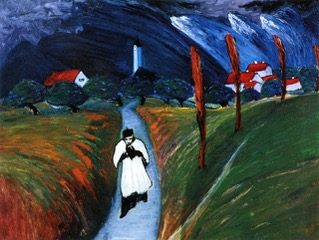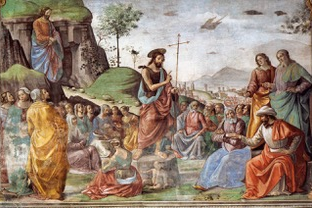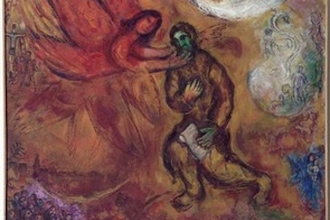Sunday Reflection with Canon Robin Gibbons: Solemnity of the Most Holy Body and Blood of Christ

Marianne von Werefkin - Corpus Christi
June 2nd 2024
The Consuming Fire of Love
Saint Ephrem the Syrian ( 307-373), writing his hymns at the edge of the Roman Empire, in modern day Turkey, the then frontier with the powerful and vast Sasanian Persian Empire, knew well the fragility of religious communities when faced with the power of human destruction. He saw his own city of Nisibis withstand three Persian sieges, only to see it handed over to the Sasanians as part of peace treaty in 363. Fleeing the city to find peace, he spent the last decade of his life in Edessa, 100 miles away. I introduce him to you all in this way, just to bring in three disparate, but important elements for our reflection. For in Ephrem's hymnography, we are firstly given a rich, ancient and deep insight into the consecrated elements of the Holy Eucharist. Secondly we receive this theological gift from the early community, at a time when Christianity was becoming established and doctrine settled and for us to look at as a window on the rich legacy of our living tradition of faith in both Eastern and Western Christianity. And thirdly; we look at the Eucharist through the eyes of a Church community rooted in the richly Christian life of Ephrem's faith, whose language was Syriac, a dialect of Aramaic, which gave this Christian tradition a deeply Semitic flavour, close to the Rabbinic tradition of Jesus' own life and therefore expressing itself liturgically and theologically somewhat differently than his Greek and Latin-speaking counterparts and allowing us to find new expressions of our own faith in rooted and deeply traditional ways.
I hope during the next year to keep returning to the traditions of the East in my reflections, partly because we will be celebrating the 1700th anniversary of the first great Council of Nicaea, when a less divided Church came together at the invitation of the Emperor and Saint (in the East) Constantine, to sort out doctrinal and disciplinary problems-but also because we need to know our Christian ancestry and make tracks to touch base with these deep sources of our faith.
All of which brings me to this great feast, celebrated only in the Western church. It originated in 1246 when Robert de Torote, bishop of Liege, ordered the festival celebrated in his diocese. This he did at the insistence of St. Juliana, prioress of Mont Cornillon near Liège (1222-58), who had experienced a vision. However it did not spread widely until 1264, when Pope Urban IV, formerly archdeacon of Liège, ordered the whole church to observe the feast. This was confirmed by Pope Clement V at the Council of Vienne in 1311-12 and by the 15th century it became one of the principal feasts of the church.
It is important that we pay attention to the background of the circumstances of this celebration as well,for this much loved feast has a folk character, I mean that in the best sense, in that it was, and is, an expression of popular but deep love and veneration of the 'Blessed Sacrament'. But we must not lose sight of the deeper fact that frequent communion had become a rarity for people at this period in the West, and that the ancient custom of reception under both forms of bread and wine was now restricted to bread alone, except to those who ministered at the Altar. In this way, although people did not receive often, through the celebration of Corpus Christi, they nevertheless retained a deep and vibrant sense of 'spiritual communion', and of course developed a rich prayer life around this feast.
In contrast the Eastern church never lost that gift of communion under both kinds to everybody, and because of their very different liturgical traditions also held on to the powerful sense of the other presences of Christ, such as in the Assembled Community, his Body, in the Word, particularly the Gospel and in the role of the Bishop and presbyters at concelebrated liturgies, all of which have been reiterated in the Conciliar texts of Vatican II.
The readings for the Liturgy today take us through the image of Blood Sacrifice and offering found in Exodus, expressing the theological richness of the great Covenant God made with Moses and the People of Israel. Our psalm echoes in song that sense of covenantal bonding and gratitude to the Lord, by which we promise to fulfil our vows to the Lord not with animal sacrifice, but by a shift to the 'sacrifice of thanksgiving'. The portion of our second reading from Hebrews makes abundantly clear that under Christ all these old practices now cease, because Christ the 'Perfect One' has by his own self-offering made the perfect sacrifice for us all : " …how much more will the blood of Christ, who through the eternal spirit* offered himself unblemished to God, cleanse our consciences from dead works to worship the living God. For this reason he is mediator of a new covenant: since a death has taken place for deliverance from transgressions under the first covenant, those who are called may receive the promised eternal inheritance".(Heb 11: 14-15)
It is to this great gift of love in the Eucharist that we are called to in celebrating this feast, and as if to help us lift the weight of controversy, and our own internal church wrangling's, the voice of Ephrem, reminds us of that word 'mystery'. In the end the Eucharist is part of the 'great mystery of faith'. In one very basic sense those gifts given us at the last supper by command of the Lord, are of ordinary bread and wine which transformed by the Spirit in our liturgy, become for us the holy gifts of Christ body and blood, both of which we are enjoined to take and eat, take and drink!
"While they were eating, he took bread, said the blessing, broke it, and gave it to them, and said, "Take it; this is my body."Then he took a cup, gave thanks, and gave it to them, and they all drank from it. He said to them, "This is my blood of the covenant, which will be shed* for many".(Mk 14: 22-24)
But what does Ephrem say to us from 1700 years ago? Some wonderful things, just as Ignatius of Antioch called the Eucharist the 'medicine of immortality', Ephrem builds on that image to call it the 'fiery gift of life', which through the Spirit energise and nourishes us, and then burns the love of God into us, so that in Christ we become charged and filled with the Spirit, penetrated and bound intimately to Christ for our own growth and action with Him. This is a mystery we need to live each day. Ephrem reminds us that this dynamic, what we can term a bridge between us and God, is love: "Divinity is not far removed
From [its] possessions, for love stands between it
And creatures". (Hymns on Faith 69:12)
This love for Ephrem has nothing to do with our pious actions or religious duties, it is quite simply the overflowing generosity of a loving God, absorbed in reaching out to us. In the Eucharist through the simple actions of eating and drinking and giving thanks for what we have received, God gives us even now a portion of immortality. Maybe in this feast though we gaze in wonder at the living, never-ending gift of eternal life, we should learn to renew our manner of receiving communion, that fire of love and life which fills us and all creation :
"Let us consume in holy fashion that Body
which the People pierced with their nails;
let us drink, as the Medicine of Life,
the Blood which flows from His side." (Armenian Hymns 48:1)[8]
For in this feast, through the holy Eucharist, we discover that paradise is regained !! Amen
Lectio
From Ephrem's Hymns
Let us look with the hidden eye
and see Him hanging from the Tree;
let our eyes behold the Blood
that flowed from His side. (Armenian Hymns 49:4)[5]
The spiritual Bread of the Eucharist
makes light and causes to fly:
the Peoples have been wafted up
and have settled in Paradise. […]
By means of the Spiritual Bread
everyone becomes
an eagle who reaches as far as Paradise.
Whoever eats the Living Bread of the Son
flies to meet Him in the very clouds. (Hymns on Unleavened Bread 17:9, 11-12)[6]
Sequence
Lauda Sion
Laud, O Zion, your salvation,
Laud with hymns of exultation,
Christ, your king and shepherd true:
Bring him all the praise you know,
He is more than you bestow.
Never can you reach his due.
Special theme for glad thanksgiving
Is the quick'ning and the living
Bread today before you set:
From his hands of old partaken,
As we know, by faith unshaken,
Where the Twelve at supper met.
Full and clear ring out your chanting,
Joy nor sweetest grace be wanting,
From your heart let praises burst:
For today the feast is holden,
When the institution olden
Of that supper was rehearsed.
Here the new law's new oblation,
By the new king's revelation,
Ends the form of ancient rite:
Now the new the old effaces,
Truth away the shadow chases,
Light dispels the gloom of night.
What he did at supper seated,
Christ ordained to be repeated,
His memorial ne'er to cease:
And his rule for guidance taking,
Bread and wine we hallow, making
Thus our sacrifice of peace.
This the truth each Christian learns,
Bread into his flesh he turns,
To his precious blood the wine:
Sight has fail'd, nor thought conceives,
But a dauntless faith believes,
Resting on a pow'r divine.
Here beneath these signs are hidden
Priceless things to sense forbidden;
Signs, not things are all we see:
Blood is poured and flesh is broken,
Yet in either wondrous token
Christ entire we know to be.
Whoso of this food partakes,
Does not rend the Lord nor breaks;
Christ is whole to all that taste:
Thousands are, as one, receivers,
One, as thousands of believers,
Eats of him who cannot waste.
Bad and good the feast are sharing,
Of what divers dooms preparing,
Endless death, or endless life.
Life to these, to those damnation,
See how like participation
Is with unlike issues rife.
When the sacrament is broken,
Doubt not, but believe 'tis spoken,
That each sever'd outward token
doth the very whole contain.
Nought the precious gift divides,
Breaking but the sign betides
Jesus still the same abides,
still unbroken does remain.


















